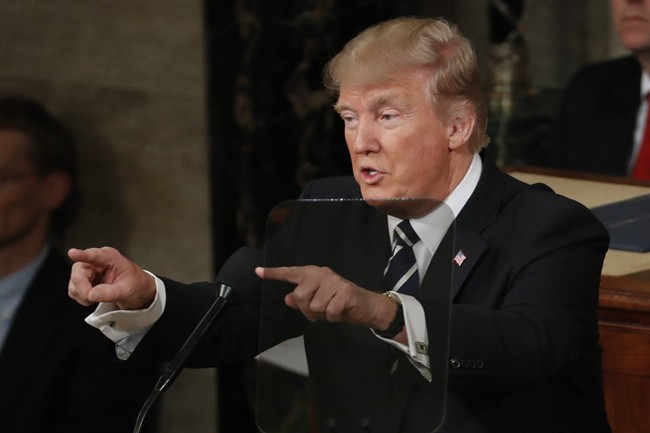U.S. President Donald Trump reiterated his plan to make a “big, big cut” to business taxes in a joint address to Congress on Tuesday.

Trump didn’t provide specifics. But observers say he could deliver a big blow to Canadian competitiveness if he follows through with plans he unveiled during his presidential campaign.
In his address, Trump said that American companies are “taxed at one of the highest rates anywhere in the world.”
He said his economic team was working on reforms that would “reduce the tax rate on our companies so they can compete and thrive anywhere and with anyone.”
“It will be a big, big cut,” he said.
This cut, if it’s anything like what he announced during the campaign, could mean he’s set to slash U.S. corporate tax rates by 20 per cent, from 35 per cent to 15 per cent.
He has also floated plans to implement a 10 per cent repatriation tax on corporate profits that were being held in other countries.
READ MORE: Full text of Donald Trump’s joint address to Congress
The corporate tax cut alone would erode Canada’s competitive advantage, Charles Lammam, director of fiscal studies at the Fraser Institute, said in an op-ed last year.
Canada currently has an average combined corporate income tax rate of 26.8 per cent, according to the OECD. That’s lower than the U.S. rate of 38.92 per cent.
Trump’s plans would reduce the U.S. rate to below 20 per cent, “erasing Canada’s advantage completely,” Lammam noted.

A competitive corporate income tax rate is key to creating a “positive economic environment,” he said.
Lammam cited Burger King’s merger with Tim Hortons as one example of a deal that happened thanks, in part, to the Great White North’s tax regime.
Trump’s changes could mean that Canada risks losing investment money that would flow elsewhere, he added.
READ MORE: Canada must stay nimble in Donald Trump era: economic adviser
Lammam isn’t alone in flagging reduced U.S. tax rates as a blow to Canadian competitiveness.
RBC analyst Matthew Barasch noted the very same concern last year.
“Canada has benefitted from having a favourable corporate tax rate relative to the U.S. and Mr. Trump’s proposal would effectively wipe away that competitive advantage,” he wrote.
But a corporate tax cut isn’t the only reform that Trump is considering.
His administration is also looking at changing the definition of corporate income to a taxation model that would see imports taxed instead of exports, The New York Times reported in December.
The new model could also see the costs of capital investments deducted right away instead of depreciating over a course of years.
READ MORE: Protecting Canada from a U.S. border tax could lie in NAFTA negotaitions: Trump adviser
If the U.S. were to implement these changes then Canada would face pressure to move the same way, University of British Columbia economics Prof. Kevin Milligan wrote in Maclean’s magazine last month.
If it didn’t, then the Great White North could lose out on investment and any jobs that come with it, he said.
Nevertheless, Milligan said that Trump’s tax changes shouldn’t make Canadian governments panic. Implementing a new tax regime in the U.S. would take time, and “the final legal product sometimes looks very different from initial proposals.”
Canada, he said, may need to respond to any changes down south.
But it should “wait and see” before taking any decisive action, Milligan added.











Comments